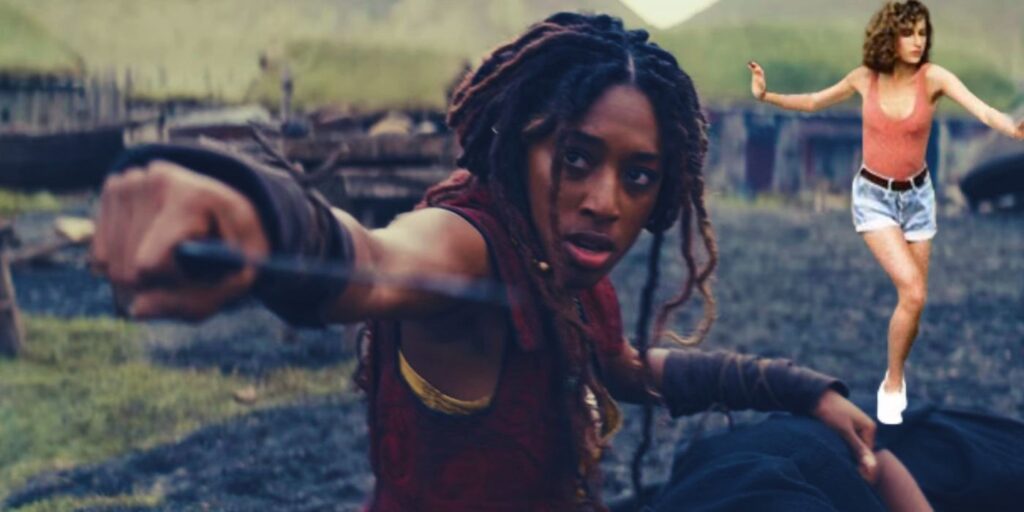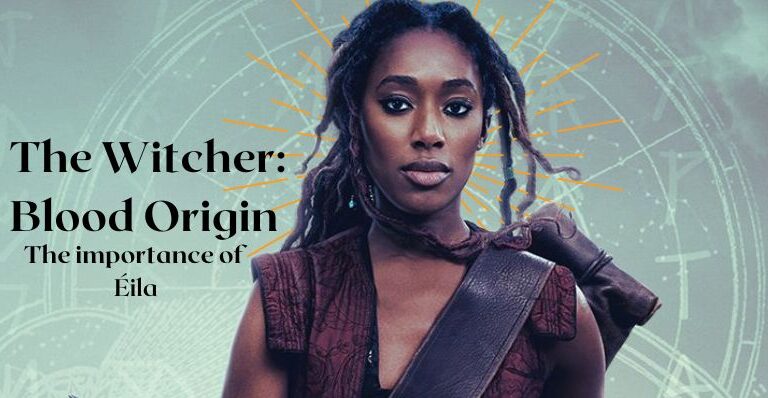I cannot confess to knowing much about The Witcher’s source material and lore. What I do know is that I rarely see People of color in high fantasy spaces, which is what initially drew me to the show. Not only that but there was a Black woman positioned in front for the promotional material, signaling that not only was she there but that she was also important. Even with that though I was still skeptical as I have been fooled before, looking at you Sleepy Hollow. Still, the promise of Sophia Brown’s beautiful face was enough to get me started and I’m happy to say I don’t regret the decision.
The Story
Éila, or the Lark as she is also referred to, starts as a warrior turned bard who is trying to make up for past wrongs by inspiring and living among the lowborn she once helped suppress. Since the whole show is only 4 episodes we learn this fairly quickly, so that when her sister shows up we already know what’s going on. Now, spoiler alert, the sister dies shortly after she’s introduced. Her death acts as the catalyst for Éila to return to her warrior roots and for the characters to know there is a conspiracy afoot.
It’s the Diversity for Me
The narrative of the show at its core is not revolutionary. A small band of strangers uniting to take down an empire… It sounds familiar. What made it significant to me is the amount of diversity the show displays. Actors of color or who are differently abled (not both though) are actually playing characters who help move the story along. That is important and made the show that much more fun. A beautiful Black woman as an elven warrior musician is something I am physically incapable of scoffing at. As someone who grew up watching the Lord of the Rings movies and realized years later that there were no people of color, Éila is precious.
For Éila to be a gifted warrior, notable musician, and brown is everything. White men have more revenge stories than you can shake a stick at. So while I don’t love that her whole clan got wiped out and her sister was murdered in front of her. I definitely support her going after the people behind it. In the process, we get to see her be a badass and someone worth protecting all at the same time. In the short time we get to spend with her we witness her kindness, her compassion, her rage, and skill.

Nobody’s perfect…
The show, despite how much I like it, isn’t perfect though. For one it is quite short for what it is trying to accomplish. Because of that length, we only get a basic understanding of many of the characters. By the time Syndril, Zacaré, and Brother Death join up, things really need to get moving, so we don’t really learn a whole lot about them outside of what’s necessary. This is a shame because Brother Death being all soft about Zacaré was adorable. I also appreciate that we got to see Meldof before she joined the group. That she had a journey of her own, even if we only got to see a fraction of it. Even with that though, the reason given for her wanting to join their cause, because she’s empty without Gwen (the person) or her quest for vengance, feels a bit lackluster. Especially because they (the narrative) took the time to state that the kingdoms, or at least Xin’trea, are built on top of stolen Dwarven land. Given that you would think a plan to kill the only living monarch would seem pretty appealing. Especially because the audience at least knows Merwyn sees herself as the next Solryth. Who as best as I can understand is the original colonizer of that world.
Éila Living was the Best Outcome… for Me
Fjall and Éila… What to say about them? I read an article from screenrant where the author thought not making Éila the Witcher prototype was a missed opportunity. It was thought out and I understand where their coming from. However, all I could think as I read was that if she were the first, she probably would have died. And for that reason, I’m glad that she wasn’t. Fjall got his dramatic death moment and Éila lost the man she loved, but frankly better him than her.
I’ve had more than my fill of Black women being sacrificial lambs for a greater cause. So I just can’t be upset that they didn’t go that route. It’s bad enough she had to lose yet another loved one, true Fjall didn’t tell her explicitly but he basically died for her so I’ll allow it, and at the end of it all she’s a single mother.
Creating Space in the Genre
As I mentioned before Black people in fantasy aren’t usually vital to the narrative, if there are any present at all. So the fact that The Witcher: Blood Origin has various kinds of representation makes it a worthwhile watch for me. It is definitely not perfect, but it moves things forward in a way I really dig.
